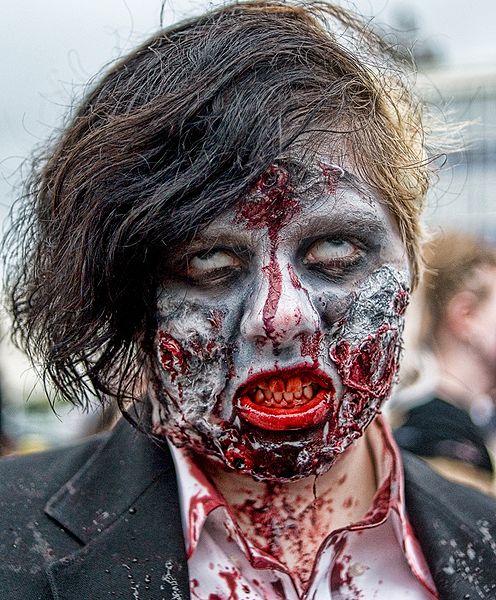What is it about zombies?
Pandemics have always exerted a particular hold on the social imagination. From as far back as Oedipus Rex, the plague reveals the fragility of the social bond, our fear and suspicion of the necessary connection that binds us. The zombie film par excellence, George Romero’s Night of the Living Dead (1968), exploits this fear — expressed in racism, sexual gaze and state coercion — to deliver a powerful social commentary in the midst of the American civil rights movement.
When what we call society admits strange and foreign company, we question the link that shackles us together. Zombies scare us not because they are different, but because they are so like us. As both Oedipus and Duane Jones discovered to their peril, when the enemy you seek to expel is indivisible from yourself, there is no way out. Aristotle called this katharsis; Romero called it terrifying.
It’s impossible, however, to talk about zombies without talking about capitalism. Certainly the insatiable appetite of the living dead has been used as a metaphor for consumerism in the shopping malls of Romero’s Dawn of the Dead (1978) and its remakes (“What are they doing? Why do they come here?” “Some kind of instinct. Memory. Of what they used to do. This was an important place in their lives”). But more than this, the rise of zombies as a modern trope coincides with the height of American capitalism at the beginning of the cold war. Richard Matheson’s I Am Legend (1954) is often cited as the alpha subject of the zombie genre, and aside from its timeliness, Marx would have something to say of Matheson’s monsters’ vampiric tendencies.
And notice how zombies almost always come in film form, or more recently, in video games. A pithy zombie short story is as absurd as it sounds. Zombie flicks are wedded to spectacle, and as capitalism went global and became more ridiculous and carnivalesque, so have dead themselves. Shaun of the Dead and Zombieland wouldn’t have been possible in the days of good ol’ Cold War capitalism.
It’s this convergence which makes the zombie such a frightening figure. Not only do the living dead, who resemble us in uncanny ways, seek to devour society at a breathless pace and destroy the social bond which knits humanity together, its gormless, centreless menace suggests they don’t even apprehend the destruction they inflict. Sound familiar? If disaster capitalism dressed up like a zombie for Halloween today, we might ask, who would notice?
So, perhaps what is truly terrifying about zombie flicks is not the living dead themselves, but us. Like Oedipus, we keep trying to find the source of the disease destroying our world but all the evidence repeatedly, and quite awkwardly, points back at us. And, like Duane Jones in Romero’s Living Dead, we might survive the onslaught of pandemic, against the odds and in spite of humanity’s greed and pettiness, only to be thwarted by our own incompetent, shortsighted and paranoid state.
It’s odd to think of zombie movies as a watered-down version of the terrifying character of global capitalism, but perhaps this Halloween when the zombie costumes come out in force, we can think about Romero’s walkers in another way: what if we let the zombies win?
Humans have proven their incompetence far too many times. Idiotically, their goal is always merely to survive, never to solve the crisis. Maybe the zombies, who rise from the grave after a cruel and contradictory world grinds them down, are the ones with the truly revolutionary spirit: relentless rather than insatiable, determined rather than unthinking, transformational rather than destructive. Humans have had their chance, and look what they’ve done with it. It’s time we handed the reins of power over to the dead. We might see a happy ending to this frightening picture for a change.



